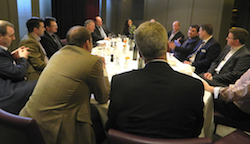 Productisation and specialisation are a blazing contradiction in terms but paradoxically their coexistence could be the key to unlocking sales in the future, according to delegates who took part in a round table debate hosted by Comms Dealer and supported by Entanet.
Productisation and specialisation are a blazing contradiction in terms but paradoxically their coexistence could be the key to unlocking sales in the future, according to delegates who took part in a round table debate hosted by Comms Dealer and supported by Entanet.
Nothing distances a sales person from a done deal as much as a lack of knowledge about what they are selling and no insights into the real needs of their prospects. Consultation is the one area that the ICT channel has not yet come close to conquering, but a strategic approach that prioritises productisation and/or specialisation could be the key to achieving positive results. This is perhaps one of the comms industry's biggest ironies: We talk endlessly about the widespread need for sales people to become consultants but what we really need are product kings.
According to research by consultancy firm Larato, ICT business leaders rate just seven per cent of their sales staff as competent in selling next generation products and services. Eighteen per cent are deemed 'quite effective'. This is no ringing endorsement of the ICT industry's ability to grow. But thanks to productisation we are not doomed by circumstance.
Julian Andrews, Director at Virocom, believes that non-basic sales pitches in many instances are inapposite and likely to fail. "Not all sales people can cope with complex solutions," he commented. "In the past we lost sales because we didn't have the basic product, so our approach has been to productise. By selling one product we secure the customer and work on up-selling more complex solutions."
Sales professionals today work in an environment where unstructured demand dominates. Compared to the traditional purchase, end user requirements are now far more fluid and buyers could be more than 50 per cent of the way through a sales cycle before contacting a supplier. "The traditional good quality solution sale is becoming a rare breed," said Andrew Skipsey, Managing Director, M12 Solutions. "These days, buyers do research and they know what they want, so getting close to them is harder. The old guard of comms buyers are a dying breed, superseded by Generation Y who want quick decisions on value, price and contract terms. We have to accept that this is the reality now. But our best sales come from getting close to the customer."
The majority of sales people are only able to sell products confidently, however the technology environment is moving towards greater complexity and solution selling. Furthermore, a new breed of knowledgeable buyer wants quick decisions, all of which adds weight to arguments in favour of simplification. "If you want to sell services through the channel you have to sell products," stated Campbell Williams, Group Strategy and Marketing Director at Six Degrees Group. "You have to go through a productisation exercise that makes the proposition easier to understand, easier to buy and easier to mark up, sell and make a margin. But productisation doesn't mean commoditisation."
As many modern buyers are close to a buying decision even before they talk to a sales person, they are at a point when a sincere demonstration of relevancy towards their business would count most. But this requires consultancy, making it more important than ever to close deals quickly and effectively. Yet in the main, a product push could be the only way to secure an early foothold within a customer's organisation, so the case for productisation seems unassailable.
Jon Walters, Director at Solar, noted: "We started out as a traditional PBX reseller but now we are moving into different silos like mobility and the cloud. This means sales people need to ask the right questions. It's no longer a case of price and product comparisons. It's now about what the solution runs on. This consultative element is a challenge. That's where productisation helps. If sales people have stock answers it gives them a fighting chance. Productisation on key products such as DIA is fantastic, before adding more value and growing the opportunity."
Frontier Voice and Data's Managing Director Michael Thornton believes that channel companies would be doing themselves a big favour if they pursued a revised strategy based on the notion of 'productise to specialise'. "We've productised heavily in the way we appear to the channel," stated Thornton. "We created five silos, with a sixth soon to be added, that cover all of our products. Partners simply visit the product pages and price up. Then prompt questions direct them to other pages for relevant options such as connectivity. By using this managed piecemeal method partners are able to build solutions."
Resellers also need to productise for the customer because buyers need to understand the product silos and how they fit together at every stage of the process. "Productisation soon becomes a matter of evolution," added Thornton. "Our 60-plus channel partners are fast becoming specialists because they are able to pick the product they want to sell and then specialise in their selections. As a channel business, productisation morphing into specialisation is key."
James Byles, former Managing Director at alwaysON (which merged with DCG last month), also has a strategic vision for the delivery of solutions based on a mix of productisation and specialisation. "In the mid-market cookie cutting is everything," he said. "Seemingly complex customer requirements can be boiled down to small packets of easily understood information. Applications like ERP and CRM, along with propriety elements, when migrated to the cloud can be delivered as a productised and bespoked bundle. It's about how you take it to market."
The mechanics of selling are straightforward, agrees Campbell, who said the penny will drop when the idea of sales people being 'coin operated' is fully realised. "If products aren't selling there has to be an issue with the productisation or the commission structure," he said. "Tweak the incentive plan and watch the behaviour change."
Traditional selling techniques have become time-worn but the rise of productisation could not be more timely. As well as helping to unlock product-based deals that open up more opportunities with the customer, productisation also enables ICT resellers to align their businesses with trends towards hosting and new business models. With more customers asking for hosted solutions, a sales process founded on the principles of productisation could both encourage the move towards an opex model while also qualifying more complex deals at the same time.
Andrews added: "We pay commissions upfront according to a recurring profit model and based on the order value. But we have established stringent checks and balances that enable us to qualify the sales. Productisation allows us to carry out checks such as the workability of the solution. Our systems won't allow sales to progress unless the selections are positively checked, compatible and complete, enabling us to deal with the variables confidently. With this mechanism we are confident to pay upfront, but without these checks it's too dangerous."
With a note of caution, Elsa Chen, Entanet's CEO, pointed out that productisation could have an unwanted flip side and widen the scope for price comparisons. She said: "Breaking a solution down into its component parts makes it easier to understand, but are we putting ourselves under pressure by exposing the pricing structure to customers? Entanet prioritises protecting our partners' margin in a competitive environment. How we achieve that while delivering a simple sell is a fine balance. And if the network solution is an absolute given, the challenge is also to differentiate between good and bad connectivity."
Fraser Ferguson, Director at Kube Networks, commented: "The Generation Y gamers are now buying connectivity and they don't want to meet you for a discussion about what they see as an absolute standard component. Productisation is about allowing the channel to understand how they sell and deliver it, and how sales people get paid.
"But as we try and push our value up we meet a different type of competition from large companies that now see the value of networking, like IBM and Google. How do we meet the challenge of big American organisations wanting to come into our space? Is it through the productisation or specialisation of solutions?"
Selling in the comms channel has become an art form that many sales people are struggling to master, and the scope for doing bad business, or no business at all, is widening. But a relationship-based truism that remains constant could save the day, especially if supported by a robust 'productise to specialise' strategy. "There is always the 'people buy from people' scenario," commented Andrews. "If a customer likes and trusts the sales person, that's a big tick in the box. By placing a perceived value in front of the customer and not competing on price, they buy into us and we get over the hurdles. The whole market is built on relationships."•
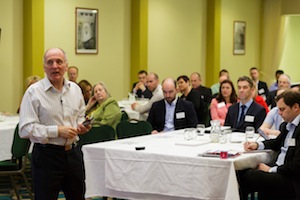 Gamma welcomed an intake of 350 channel partners during its 2014 university themed roadshow. The Universities UK tour visited Heriot-Watt University in Edinburgh, The University of Manchester, Keele University and Imperial College London.
Gamma welcomed an intake of 350 channel partners during its 2014 university themed roadshow. The Universities UK tour visited Heriot-Watt University in Edinburgh, The University of Manchester, Keele University and Imperial College London.
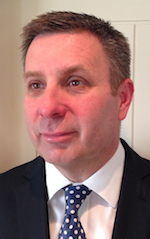 Hosted UC specialist thevoicefactory is in full production mode according to Sales Director Paul Harrison who has manufactured a strong pedigree in advancing the market for hosted solutions.
Hosted UC specialist thevoicefactory is in full production mode according to Sales Director Paul Harrison who has manufactured a strong pedigree in advancing the market for hosted solutions.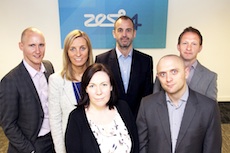 Last year the team behind Yes Telecom's success reunited to launch Zest4, a fast expanding company with big ambitions to take partners on a growth journey in the UC space. Here's their story...
Last year the team behind Yes Telecom's success reunited to launch Zest4, a fast expanding company with big ambitions to take partners on a growth journey in the UC space. Here's their story... Fusion Media Networks Managing Director Lee Norvall has gained a reputation for turning clarity of vision into strategic reality. Here's his story...
Fusion Media Networks Managing Director Lee Norvall has gained a reputation for turning clarity of vision into strategic reality. Here's his story...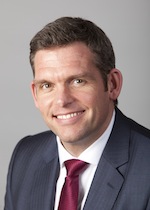 A new force in comms has mobilised under the leadership of former commando Darren Hilton who's doffed his Green Beret in recognition of the high margin potential inherent in the Timico Partner Services channel campaign.
A new force in comms has mobilised under the leadership of former commando Darren Hilton who's doffed his Green Beret in recognition of the high margin potential inherent in the Timico Partner Services channel campaign. tIPicall has mounted a credible challenge to become a main contender in the UK SIP and hosted market according to Sales Director Steve Harrington who has the bit firmly between his teeth. Here, he talks strategy and SIP education.
tIPicall has mounted a credible challenge to become a main contender in the UK SIP and hosted market according to Sales Director Steve Harrington who has the bit firmly between his teeth. Here, he talks strategy and SIP education.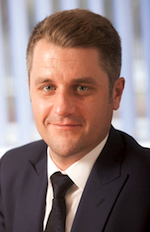 Not yet 12 months old True Telecom has already displayed a remarkable knack for driving growth having already made big strides in the small business sector, and according to CEO Stuart Griffiths the company is aiming to make an even bigger stamp on the market this year.
Not yet 12 months old True Telecom has already displayed a remarkable knack for driving growth having already made big strides in the small business sector, and according to CEO Stuart Griffiths the company is aiming to make an even bigger stamp on the market this year.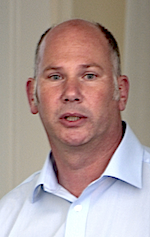 Few industry figures deserve the label 'seasoned comms veteran' as much as Robin Hayman, SpliceCom's Director of Marketing and Product Management, whose watchwords 'no direct sales, no trade distribution' continue to pay off for the innovative vendor and its channel partners.
Few industry figures deserve the label 'seasoned comms veteran' as much as Robin Hayman, SpliceCom's Director of Marketing and Product Management, whose watchwords 'no direct sales, no trade distribution' continue to pay off for the innovative vendor and its channel partners. By Elvire Gosnold, Director, Blabbermouth Marketing: One of the first questions I am asked when meeting a prospective client for the first time is, 'How do you ensure my adverts will not look the same as the other adverts in the same publication?'. The answer is 'brand'.
By Elvire Gosnold, Director, Blabbermouth Marketing: One of the first questions I am asked when meeting a prospective client for the first time is, 'How do you ensure my adverts will not look the same as the other adverts in the same publication?'. The answer is 'brand'. Productisation and specialisation are a blazing contradiction in terms but paradoxically their coexistence could be the key to unlocking sales in the future, according to delegates who took part in a round table debate hosted by Comms Dealer and supported by Entanet.
Productisation and specialisation are a blazing contradiction in terms but paradoxically their coexistence could be the key to unlocking sales in the future, according to delegates who took part in a round table debate hosted by Comms Dealer and supported by Entanet.